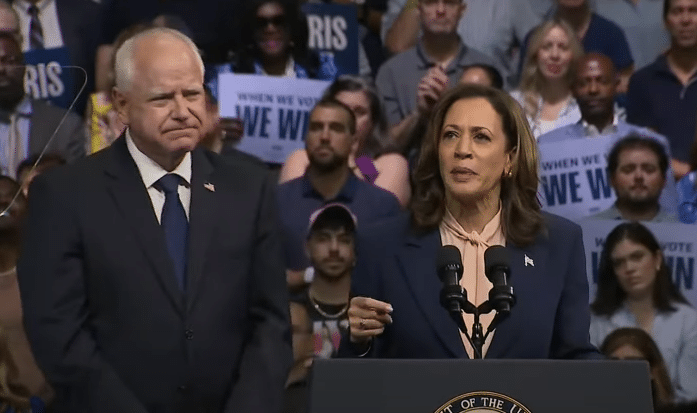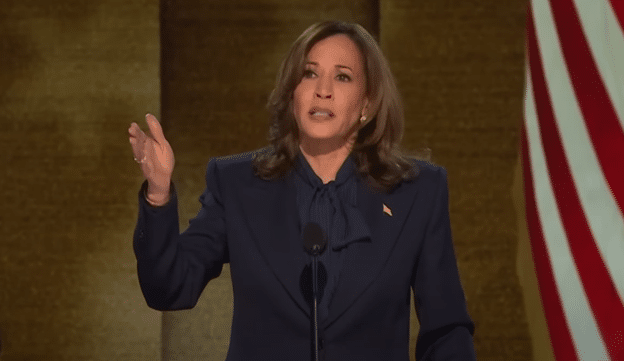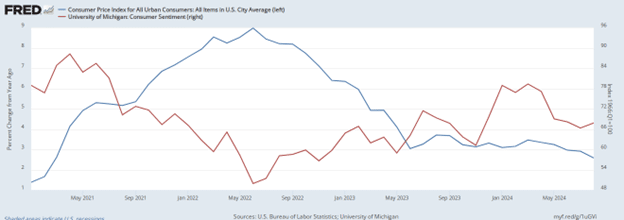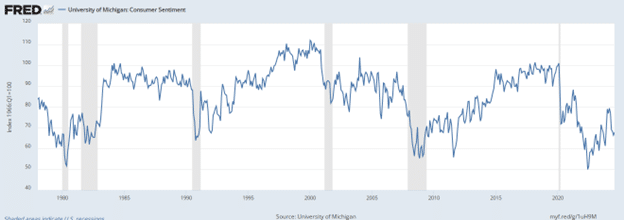
October 2, 2024
Permission to republish original opeds and cartoons granted.
Tim Walz couldn’t say why voters trust Donald Trump more on the economy than Kamala Harris. It’s because the economy stinks.
| 
|
|
Minnesota Democratic Governor Tim Walz had no answer for CBS News’ debate moderators for why “voters say they trust Donald Trump on the economy more” than Vice President Kamala Harris in his Oct. 1 debate with Ohio Republican Senator J.D. Vance, dodging the question. Trump’s advantage has been consistent in national surveys, for example, in the CNN national poll take Sept. 12 to Sept. 19 taken after the presidential debate, he led Harris 50 percent to 39 percent on the economy. It might be something still mystifying Democrats even after all the votes are counted in November, but it's actually quite simple. The economy stinks, and the American people know it in their hearts. From Jan. 2021 through July 2021, Biden had a 52 percent approval rating on the economy and a 42 percent disapproval rating on the economy, according to the RealClearPolling.com average of national polls. In Aug. 2021, with inflation already above 5 percent, before the botched Afghanistan withdrawal, it turned negative, with 48 percent disapproving and 46 percent approving. From there it was all downhill, with inflation rising to 6.2 percent in Oct. 2021, 6.8 percent in Nov. 2021, 7.1 percent in Dec. 2021 and 7.5 percent by Jan. 2022, a month before Russia invaded Ukraine. From Sept. 11, 2021 through the end of Jan. 2022, Biden’s disapproval on the economy worsened to an average of 52 percent, with only 40.6 percent approving. From the start of Russia’s invasion of Ukraine in Feb. 2022 through peak inflation in June 2022, when inflation peaked at 9.1 percent, the Biden-Harris administration’s approval only worsened, with disapproval rising to an average of 56.9 percent and approval down to 37.6 percent. After that, it has barely recovered, with disapproval averaging 56.4 percent since peak inflation and approval 39.7 percent approving through present. Does it rub off on Kamala Harris? |
As Latinos Grow as a Share of the Vote, They are Voting Less and Less for Democrats
| 
|
|
Vice President Kamala Harris is continuing to struggle with Hispanic voters, a group that was already beginning to distance itself from President Joe Biden by late last year. According to a brand new national NBC News/Telemundo/CNBC poll, Harris is now polling just 14 points above former President Donald Trump with Hispanic voters, 54 percent to 40 percent. The Pew Research Center also recently released a new poll looking at Hispanic voters, and found Harris ahead of Trump by 18 points, 57 percent to 39 percent. While both polls show Harris leading Trump among Hispanics, her lead is much smaller and more worrisome to Democrats when placed in historical context. Latinos have been a bedrock of the Democratic Party for several generations, with Democrats winning their vote in every election since 1972. Democrats generally win the Latino vote by 33 points or more, as has been the case in every recent election except for 2004, when George Bush won an historic 44 percent of their vote. Other than Bush’s number in 2004, Republicans have mostly lost the Latino vote by at least 33 points. Does this mean Trump will outright win Latinos? It is very unlikely, but the state of the economy, combined with Latino sentiment in polls, reveals that Trump could win as much as 40 percent – just four points shy of George Bush’s 2004 number. |
Tim Walz couldn’t say why voters trust Donald Trump more on the economy than Kamala Harris. It’s because the economy stinks.

By Robert Romano
Minnesota Democratic Governor Tim Walz had no answer for CBS News’ debate moderators for why “voters say they trust Donald Trump on the economy more” than Vice President Kamala Harris in his Oct. 1 debate with Ohio Republican Senator J.D. Vance. Walz chose to dodge the question and shift his answer to talking about tax, trade and manufacturing policies.
Trump’s advantage has been consistent in national surveys, for example, in the CNN national poll take Sept. 12 to Sept. 19 taken after the presidential debate, he led Harris 50 percent to 39 percent on the economy.
It might be something still mystifying Democrats even after all the votes are counted in November, but it's actually quite simple. The economy stinks, and the American people know it in their hearts.
This has been a constant theme in the campaign: after peak annual inflation in June 2022 of 9.1 percent, the worst in 40 years, and incomes still have not caught up, a majority of Americans no longer trust President Joe Biden and Vice President Harris’ administration of the U.S. economy, and they see it getting worse.
This can easily be seen when consumer confidence is measured against inflation, showing a direct inverse relationship: The higher inflation goes, the worse consumer confidence gets, and then after, it takes a long while for confidence to be recovered.

Using the University of Michigan’s metric, consumer sentiment today is even lower today at 67.9 than when Jimmy Carter lost reelection to Ronald Reagan in 1980 at 76.7, much lower than when Reagan was reelected in 1984 at 95.7 and George H.W. Bush won in 1988 at 93, lower than 1992 when Bush lost reelection to Bill Clinton at 85.3, lower than 2004 when George W. Bush won reelection at 92.8, lower than 2012 when Barack Obama was reelected at 82.7 and lower than 2020 when Donald Trump barely lost reelection to Biden with sentiment at 76.9.

In fact, by Aug. 2021, when inflation had already climbed above 5 percent and was eating into household budgets, still a month before the botched U.S. military withdrawal from Afghanistan that threw the country into chaos and let the Taliban take over — it also contributed to an overall drop of approval for Biden but that was not the singular cause of Biden and Harris’ decline — both Biden and Harris were upside down on the economy, and as inflation worsened, so did voter approval of the administration’s handling of the economy.
From Jan. 2021 through July 2021, Biden had a 52 percent approval rating on the economy and a 42 percent disapproval rating on the economy, according to the RealClearPolling.com average of national polls. In Aug. 2021, it turned negative, with 48 percent disapproving and 46 percent approving.
From there it was all downhill, with inflation rising to 6.2 percent in Oct. 2021, 6.8 percent in Nov. 2021, 7.1 percent in Dec. 2021 and 7.5 percent by Jan. 2022, a month before Russia invaded Ukraine.
From Sept. 11, 2021 through the end of Jan. 2022, Biden’s disapproval on the economy worsened to an average of 52 percent, with only 40.6 percent approving.
From the start of Russia’s invasion of Ukraine in Feb. 2022 through peak inflation in June 2022, the Biden-Harris administration’s approval only worsened, with disapproval rising to an average of 56.9 percent and approval down to 37.6 percent.
After that, it has barely recovered, with disapproval averaging 56.4 percent since peak inflation and approval 39.7 percent approving through present.
Most recently, and what might matter the most with the election just a month away and early voting beginning now, since September, 56.4 percent disapprove of the administration’s handling of the economy and only 40.8 percent approve. That’s crappy. But does it rub off on Kamala Harris after Joe Biden was removed from the Democratic ticket?
So far, the answer has been yes, when Harris is juxtaposed with Trump in who would do a better job handling the economy, with Trump consistently leading by double digits. Incomes were rising far faster than inflation during the Trump years, and voters remember, and that made it an insurmountable race for Biden and still a really tough race for Harris.
Harris could still win with swing state polls very tight, but that is owed to her representing the incumbent White House party, the Democrats, in their first term, and first term incumbent parties win about 66.6 percent of the time regardless of the nominee.
As much as Harris benefits from the incumbency advantage, though, that also means she bears the burden of incumbency when voters consider the state of affairs, especially their personal finances and the economy.
As Jame Carville famously quipped in 1992, “It’s the economy, stupid!” and so far, after two debates by Harris and Walz to make their case for continuing the policies of the current administration, Democrats still have no answer. Is it too late?
Robert Romano is the Vice President of Public Policy at Americans for Limited Government Foundation.
To view online: https://dailytorch.com/2024/10/tim-walz-couldnt-say-why-voters-trust-donald-trump-more-on-the-economy-than-kamala-harris-its-because-the-economy-stinks/
As Latinos Grow as a Share of the Vote, They are Voting Less and Less for Democrats

By Manzanita Miler
Vice President Kamala Harris is continuing to struggle with Hispanic voters, a group that was already beginning to distance itself from President Joe Biden by late last year.
According to a brand new national NBC News/Telemundo/CNBC poll, Harris is now polling just 14 points above former President Donald Trump with Hispanic voters, 54 percent to 40 percent. The Pew Research Center also recently released a new poll looking at Hispanic voters, and found Harris ahead of Trump by 18 points, 57 percent to 39 percent.
While both polls show Harris leading Trump among Hispanics, her lead is much smaller and more worrisome to Democrats when placed in historical context. Latinos have been a bedrock of the Democratic Party for several generations, with Democrats winning their vote in every election since 1972.
Democrats generally win the Latino vote by 33 points or more, as has been the case in every recent election except for 2004, when George Bush won an historic 44 percent of their vote. Other than Bush’s number in 2004, Republicans have mostly lost the Latino vote by at least 33 points.
However, since Trump’s emergence as a voice for the working-class in 2016, Latinos have been incrementally shifting toward Republicans – and this November could be the largest gain for Republicans since Bush’s 2004 victory.
Let’s look at where Joe Biden, a relatively popular and well-known figure from the Obama Administration, was with Latinos four years ago. Biden won Latinos by 33 points, 65 percent to 32 percent according to exit polls.
The way polling currently sits, Harris will earn around fourteen to eighteen percentage points less than Biden did four years ago with Latinos. That is a devastating blow to Democrats and could cost them heavily in battleground states with robust Latino populations like Arizona, Florida, Nevada and Texas.
Going back even further to the 2016 election, Hillary Clinton won Hispanics by 36 points, meaning that Hispanics appear to have shifted around eighteen to twenty-two points toward Trump over the past eight years.
Why? First, this isn’t necessarily about Kamala Harris, although her unapproachable demeanor and failures within the Biden Administration could be contributing factors. Latino support for Biden and Democrats has been dropping precipitously over the past eight years, as the toll of globalism has accelerated the decline of the U.S.
Latinos for the most part, are highly economically motivated, with issues like the economy, inflation, and wages regularly topping their list of concerns. According to YouGov, Latinos are in fact the most economically motivated voters, with a full 32 percent of Latinos saying inflation is their number one issue compared to 24 percent of whites and 23 percent of Blacks in a recent poll.
The same poll finds Latinos disapprove of the Biden Administration’s handling of inflation by 21 points, 56 percent to 35 percent, and disapprove of Biden’s handling of jobs and the economy by 13 points, 50 percent to 37 percent.
Further, it has not escaped Latinos that Harris has been in leadership for the past four years – presiding over one of the worst economies in recent history, as well as the most porous border in the modern era.
In a recent analysis we did of New York Times/Siena College polling, we found that Hispanics blame Harris for the border crisis by a 28-point margin, 52 percent to 24 percent, and they also blame her for inflation by seven points.
Meanwhile, despite being maligned by the mainstream media and institutional power at every level, Trump appears to be paving a road back toward securing a much larger share of the Latino vote than Republicans have in twenty years.
Does this mean Trump will outright win Latinos? It is very unlikely, but the state of the economy, combined with Latino sentiment in polls, reveals that Trump could win as much as 40 percent – just four points shy of George Bush’s 2004 number.
Beyond November’s election, there are vast implications to this working-class Latino realignment toward the right. Whether it is a once in a few decades event, or a more permanent realignment toward conservatives remains to be seen.
What is clear is that just as working-class whites began to detach themselves from the Democratic Party at rapid speed in 2016, working-class Latinos have been following the same trajectory. We also know from past research that Latinos are one of the fastest growing demographics in the country, and that younger Latinos are even less likely to identify as Democrats compared to older Latinos.
Data from UnidosUS reveals that a huge reason why polls show such a decline for Democrats is because newly registered Latinos, especially younger voters, are much less likely to identify as Democrats. UnidosUS data found almost 40 percent of the Latino electorate this November will be new voters compared to the 2016 election, and newer voters are fourteen points less likely to be Democrats compared to established voters. Just 45 percent of newer voters identify as Democrat, compared to 59 percent of more established voters, according to the data.
In other words, a key population in the U.S. that is increasing, is increasingly less likely to vote for Democrats. “Demographic Destiny” might not be favoring conservatives entirely, but it can be argued that it isn’t favoring the left entirely either.
Manzanita Miller is the senior political analyst at Americans for Limited Government Foundation.
To view online: https://dailytorch.com/2024/10/as-latinos-grow-as-a-share-of-the-vote-they-are-voting-less-and-less-for-democrats/
